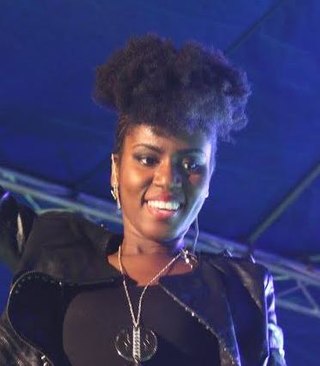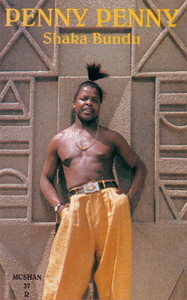Hiplife is a Ghanaian musical style that fuses Ghanaian culture and hip hop. Recorded predominantly in the Ghanaian Akan language, hiplife is rapidly gaining popularity in the 2010s throughout West Africa and abroad, especially in the United Kingdom, United States, Canada and Germany.

Soul to Soul is a 1971 documentary film about the Independence Day concert held in Accra, Ghana ,on 6 March 1971. It features an array of mostly American R&B, soul, rock, and jazz musicians.

Elom Adablah, better known by his stage name E.L, is a Ghanaian Afrobeats musician, rapper, singer and producer.

Richie Mensah, better known by his stage name Richie, is a Ghanaian singer-songwriter and record producer. After producing records for several artists, Richie set up Lynx Entertainment record label and released his debut album All of Me on the label in 2008. He has since then gone on to win several awards both as a singer and record producer and is fast establishing himself as one of the biggest names in the Ghanaian music industry.

Michael Owusu Addo known professionally as Sarkodie, is a Ghanaian rapper, songwriter, and entrepreneur from Tema. He started rapping at a young age and has since become a household name in the Ghanaian and Global music industry. His contributions to the Ghanaian music industry have earned him numerous accolades, including the Vodafone Ghana Music Award (VGMA) for "Artiste of the Decade". He was announced the first winner of BET's Best International Flow Artist at the 2019 BET Hip Hop Awards. He is also considered one of the major proponents of the Azonto genre and dance and one of the most successful African rappers of all time. Due to the variety of musical genres he can perform in, Sarkodie is referred to as a "multifaceted rapper" and frequently raps in his native language, Twi.

Sarkology is the third studio album by Ghanaian rapper Sarkodie. It was released by Duncwills Entertainment on January 2, 2014. Primarily recorded in Twi, the album features guest appearances from Fuse ODG, Davido, Tiwa Savage, Banky W., Timaya, 2 Face Idibia, Efya, Mugeez, Obrafour, Burna Boy, Vivian Chidid, Vector, Silvastone, Sk Blinks, Stonebwoy, Joey B, J Town, Lil Shaker, Raquel, Sian, Kofi B and AKA. Its production was handled by Magnom, Hammer, KillBeatz, Masterkraft and Silvastone, among others.

Rebecca Akosua Acheampomaa Acheampong, known mononymously as Becca, is a Ghanaian singer, songwriter and actress. She first gained recognition as a contestant on the second season of TV3's annual singing competition Mentor. Her debut studio album Sugar was released in 2007; it earned her five nominations at the 2008 Ghana Music Awards, including Record of the Year for "You Lied to Me". On 16 May 2013, Becca released her second studio album Time 4 Me, which features guest appearances from 2face Idibia, MI, King Ayisoba, Trigmatic, Jay Storm and Akwaboah. The album was certified 2x platinum in Ghana.

Vera Hamenoo-Kpeda, better known by her stage name MzVee, is a Ghanaian singer, afropop, dancehall and R&B artiste. Her debut solo album features several hit singles including 'Borkor Borkor, 'Natural Girl' and 'Dancehall Queen'. MzVee was signed to the record label Lynx Entertainment and was the winner of the New Artiste of the Year award at the 2015 Ghana Music Awards. She parted ways with Lynx Entertainment in the year 2019. She is currently a solo artist.

Joseph Oscar Nii Armah Mettle, recognised by his stage name Joe Mettle, is a Ghanaian gospel singer and songwriter. On April 8, 2017, he made history by being the first Gospel musician to win the coveted Artist of the year award at the 2017 Ghana Music Awards. He has won many awards in Ghana and beyond, and has performed on international stages with International Gospel Artistes like Donnie McClurkin, Nathaniel Bassey, Ntokozo Mbambo, Michael Stuckey and many more. He is married to Selassie Mettle.

Adjei Nelson Otumfour, better known by his stage name AJ Nelson is a Ghanaian recording artist and activist. He is most famous for the singles “Same Girl,” “Faith” and “Power to the People”. He was the first Ghanaian musician to rap in Bono language. In 2015, AJ Nelson released the song titled “Power To the People” and lead a campaign in Ghana to encourage youths not only from Ghana but also from other parts of Africa to speak against the corruption and conflicts the continent is engulfed in and hold their political leaders accountable. According to AJ Nelson, the people most affected need to be empowered to voice their thoughts out to their leaders. The campaign got the attention of top Ghanaian personalities including the renowned Head of Global Parliamentary Engagement at World Bank, Mr. Kofi Tsikata and media personality Berla Mundi who both joined the campaign. In November 2015, the song was ranked the 3rd most downloaded Ghanaian Hiphop Song on iTunes. AJ Nelson was ranked the 3rd top-selling artist on iTunes in November 2015.
Awesome Tapes From Africa is a record label and website operated by Brian Shimkovitz, based in Los Angeles, California. The site was founded in 2006 in Brooklyn, New York.

Oluwatosin Oluwole Ajibade, better known by his stage name Mr Eazi, is a Nigerian singer, songwriter, and record executive. He is the pioneer of Banku music, a fusion of sound he describes as a mixture of Ghanaian highlife and Nigerian chord progressions and patterns. Mr Eazi relocated to Kumasi in 2008 and enrolled at KNUST, where he began booking artists to perform at college parties. He showed interest in music after recording a guest verse on "My Life", a song that gained traction and became a popular record at KNUST. Mr Eazi released his debut mixtape About to Blow in 2013. He gained an international audience following the release of the Efya-assisted single "Skin Tight". His second mixtape, titled Life Is Eazi, Vol. 1 – Accra To Lagos, was released in 2017.
Maradona Yeboah Adjei ,, also known by his stage names Guru and Gurunkz, is a Ghanaian rapper and fashion designer. Guru NKZ is a successful hiplife artist in Ghana. He is known for his contemporary hip-hop rap style that combines English and Ghanaian indigenous languages. Guru's breakthrough was in 2011 when his hit song "Lapaz Toyota" appeared on the Ghanaian music charts. Guru is considered a contemporary hip-hop artist, as his songs venture new ground in the Ghanaian music scene, mixing hip-hop, Afrobeats, highlife, and dancehall sounds.

Benjamin Lazar Davis is an American multi-instrumentalist, singer-songwriter, arranger, composer and record producer. He is a member of several bands, including Okkervil River and Cuddle Magic. Davis attended New England Conservatory of Music.

Nii Kommetey Commey also known as King of Accra is a Ghanaian Record producer, sound engineer and rapper-singer. His work on the Bra bɛ whɛ song by Sarkodie which features Guru and himself gained him attention in Ghanaian music circles. Nii Kommetey's productions includes "You already know" off the Sarkology album by Sarkodie and Daabi and This Game which are hit singles by Sarkodie between 2009 and 2015 respectively. Other productions of his are "Pressure Girl" and Solo Artist by Samini, and "Bakaji" by DJ Mensah.
Priscilla Opoku-Kwarteng, known by her stage name Ebony Reigns, was a Ghanaian dancehall/Afrobeats artist known for her hit songs "Poison" and "Kupe". She was discovered by Bullet from Ruff n Smooth.

Hailu Mergia & His Classical Instrument, also known as Shemonmuanaye, is a 1985 studio album by Ethiopian jazz musician Hailu Mergia, formerly of the Walias Band. After the band split up in 1983, Mergia moved to the United States and began studying music at Howard University, during which time he discovered an accordion and began playing it. Initially intending to record a cassette of himself playing the accordion in a small studio belonging to an acquaintance at Howard, he also incorporated other instruments in the studio, such as a Rhodes piano and synthesiser.

Shaka Bundu is the debut album by South African musician Penny Penny released in 1994. Penny was discovered in a Johannesburg recording studio by producer Joe Shirimani, who was impressed by Penny's unique vocal style. Shirimani's record label Shandel Music enjoyed the demos he produced for Penny, and let the pair record an album together. Recorded over the space of one week using an Atari computer, Korg M1 synthesiser and reel-to-reel tape, the album blends the Tsonga disco style of music with American house music, reflecting the popularity of American and British electronic dance music in South Africa. It has been credited for pioneering a new style of Tsonga disco with its fusion of slow house rhythms, synthesised steel drums and Penny's modern vocal style atop traditional call-and-response female backing vocals.
SK Kakraba is a Ghanaian musician and performer of the country's traditional music. He makes and performs gyils, a xylophone containing 14 suspended wooden slats stretched over calabash gourds containing resonators. He was taught to build the instruments using a rare wood known by the Lobi as neura. Kakraba explained: "It's a very hard process, because you have to get the wood from five different places, only found in Ghana’s forests. The trees fall on their own and when they do, you cut them, dry the wood and lay the keys." LA Weekly has referred to Kakraba as the "world's greatest" xylophone player, and he has toured worldwide playing the gyil.
Bernard Woma was a well-known Dagara gyile player from Upper West Ghana who spent many years teaching the instrument and introducing it to audiences around the world. Woma earned two master's degrees in African Studies and Ethnomusicology at Indiana University. He was xylophonist and lead drummer of the National Dance Company of Ghana and of Saakumu Dance Troupe. He performed with New York Philharmonic, South Dakota Symphony Orchestra, the Minnesota Orchestra and the Albany Symphony Orchestra as well as Berliner Symphoniker in Berlin, Germany, and KwaZulu Natal Symphony Orchestra in Durban, South Africa. He performed his gyil concerto composition "Gyil Nyog Me Na" in 2006 at Zankel Hall in Carnegie Hall, New York. He also founded Dagara Music and Arts Center in Accra, Ghana.















